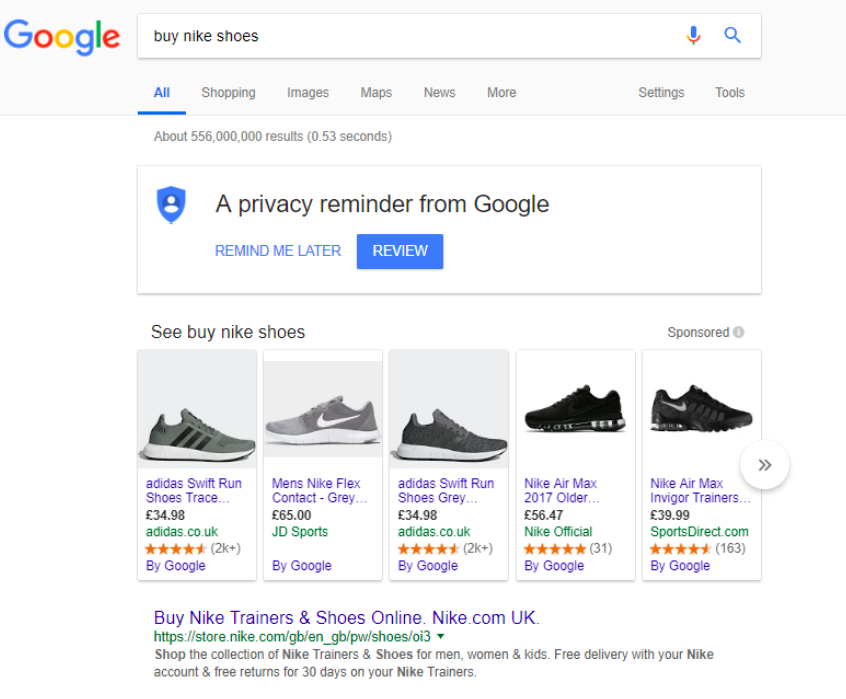Search Engine Spiders/ Bots/ Crawlers
Search Engines have what are known as crawlers exploring the web, bouncing around from webpages to webpages discovering new content every day. These crawlers do so, by visiting a website just like yours, either through your submission of your website for their considera#on or by finding you through a reference (a link) from another website.These crawlers following websites link to find other pages and rank those pages in the search engine’s index according to their unique algorithm.
Search Engine Algorithms
It is an SEO analysts job to create a website that #cks all of the boxes that a search engine is looking for. Most search engines won’t explain the algorithm they use as they don’t want people to purposefully manipulate them to get their website ranking highly if it doesn’t deserve to.Anybody caught manipula#ng the algorithm to rank their site highly will be subjected to penalisation or de-indexing from the search engines results. This can lead to massive drops in visitors and as a result, revenue.
Most Popular Search Engines
- Google – Unsurprisingly Google holds the largest share in the search engine market. It is presumed that a lot of research around Search Engine Op#misa#on is based on Google’s algorithms. Although, if you rank highly on Google, you usually rank highly on other search engines too!
- Bing – Microsoft’s a6empt to challenge Google. Bing has its own perks such as be6er video search and additional autocomplete sugges#ons. Their analytics platform I find is much more user friendly, especially for SEO’s.
- Yahoo – Powered by Bing and is s#ll one of the most popular email providers, yahoo s#ll brings in a decent amount of searches!
- Ask.com – Formerly known as Ask Jeeves. Ask.com holds a 0.05% of search share.
- Ecosia – Mentioning this one because I feel it needs some recogni#on. Powered by Bing, Ecosia uses 80% of their profits for tree planting around the world. For more information click here
- Duck Duck Go – Duck Duck Go have a mention due to their growing interest. Privacy concerns online are becoming increasingly prevalent. Duck Duck Go, is a search engine that won’t track or take any data from you.
 As you can see interest is rising on Duck Duck Go, so you can expect to hear more of them in the future!
As you can see interest is rising on Duck Duck Go, so you can expect to hear more of them in the future!User Intent
When a user makes a search on a search engine, it generally falls under one of these categories:Do – These queries usually involve an ac#on, such as buying a product or service or watching a video online. Google will tailor the search results to accommodate these three queries. For example, if I make a search on Google which falls under the ‘Do’ category I may see something like this at the top of the search:
 So what if I type in another ‘Do’ action that isn’t based on e-commerce? Lets say ‘Tes#ng Internet Speed’
So what if I type in another ‘Do’ action that isn’t based on e-commerce? Lets say ‘Tes#ng Internet Speed’ Served with another quick and easy action.Know – A query that results in learning some informa#on such as football results.
Served with another quick and easy action.Know – A query that results in learning some informa#on such as football results. As you can see, Google has accommodated this sort of search query as well. Looking for addresses of places also falls under this category (not to be confused with the next category)Go – These are navigational searches, not for navigating to a physical location (that falls under the ‘know’ category). These navigational searches are for going to a particular webpage. This can be like ‘Facebook’ or ‘Stumble Upon’. When typing ‘Facebook’ into Google, Google recognises that just showing you the first link straight to Facebook is going to be best.
As you can see, Google has accommodated this sort of search query as well. Looking for addresses of places also falls under this category (not to be confused with the next category)Go – These are navigational searches, not for navigating to a physical location (that falls under the ‘know’ category). These navigational searches are for going to a particular webpage. This can be like ‘Facebook’ or ‘Stumble Upon’. When typing ‘Facebook’ into Google, Google recognises that just showing you the first link straight to Facebook is going to be best. Because it is difficult to understand exactly what category this search falls into, you will also be greeted (further down the page) some other suggestions in case this falls into a ‘Know’ Category (also why the Stock Price and a description about Facebook appears in the above image). Or a Do Category:
Because it is difficult to understand exactly what category this search falls into, you will also be greeted (further down the page) some other suggestions in case this falls into a ‘Know’ Category (also why the Stock Price and a description about Facebook appears in the above image). Or a Do Category:
A quick word
As the leading Search Engine, this article will be based on Google’s algorithms. Most of the research conducted that has been put into this article was tested against the effects it has on Google.

0 Comments